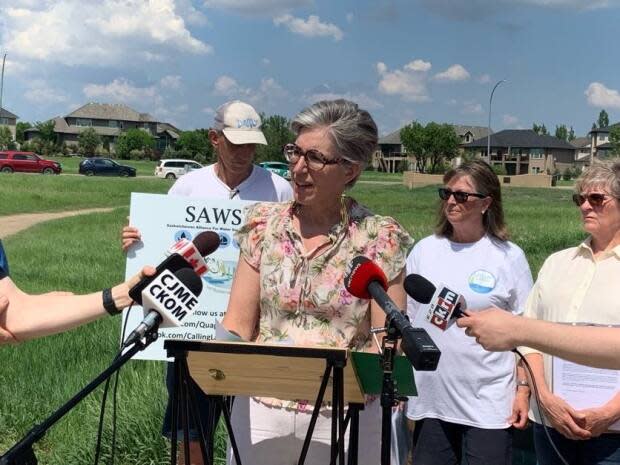Advocates call on Sask. government to create wetland policy before agricultural water policy

The Saskatchewan Alliance for Water Sustainability (SAWS) and other water advocacy groups are calling on the province to create a wetland policy.
About 10,000 acres of wetlands are lost on average each year in Saskatchewan, according to Ducks Unlimited. It is the only province without a comprehensive policy to manage and preserve wetlands.
Advocates said they are concerned that the province's new upcoming Agricultural Water Stewardship Policy will maintain existing drainage and create new wetland drainage projects.
The policy aims to help farmers deal with occasional overland flooding.
"We need a wetland policy like Alberta, Manitoba, the rest of Canada first. And then we can tailor the policies to each industry," said Aura Lee MacPherson, co-chair of SAWS.
SAWS wants Saskatchewan to stop draining its wetlands. It said wetlands are critical to the survival of many species.
They store water during floods, reduce damage from droughts and replenish groundwater.
SAWS said loss of biodiversity and wetlands comes with real economic, social and environmental costs, including health risks and increased water treatment costs.
Advocates say the new Agricultural Water Stewardship Policy will also threaten lakes and rivers with excess nutrients, and increase toxic algal blooms.

Erika Ritchie, NDP critic for the Water Security Agency, said the Agricultural Water Stewardship Policy is not only bad for the environment, but also tourism.
"Everyone wants to be able to enjoy the weekend at the cabin, at a recreational facility. And to show up and there's blue-green algae and swimming advisories … your experience is dramatically impacted," Ritchie said.
Ritchie said municipalities have called for a provincial wetland strategy. She also noted that the provincial auditor has identified the need as well.
"Communities that rely on groundwater for their potable water … and now they're going dry as a result of magnitude of drainage … those are the kinds of issues we're talking about," said Ritchie.
"We're not asking the government for a lot here. Just develop a wetland policy similar to those already in place in the neighbouring jurisdictions."
WATCH | Advocates call on Sask. government to create wetland policy:
Climate change
SAWS, Calling Lakes Ecomuseum and Last Mountain Lake Stewardship Group said creating a separate wetland policy before an agricultural water policy is crucial, because wetlands also store large amounts of carbon, which is instrumental in fighting climate change.
"We can fix this. We have the ability to restore wetlands and preserve them. We can't restore glaciers. We can't restore the way a mountain snow-pack melts," said Clint Blyth, a geologist who farms near the Pipestone Creek south of Moosomin.
He said he has seen significant surface water issues evolve since 2011, as water is being drained from the landscape. Blyth said the act of draining water off land that is used for farming is detrimental to future success.
"These guys are nuts. Do they realize what they're doing to their land and what the impacts and ramifications are of that?"

Government response
SAWS has kicked off a letter-writing campaign to urge Premier Scott Moe to create a wetland policy, rather than embedding wetland policy within an agricultural drainage framework.
In addition to environmental concerns, advocates said the Agricultural Water Stewardship Policy lacks explicit conservation and restoration measures for wetlands, as well as meaningful enforcement.
They also said a wetland policy needs Indigenous input.
In a statement to CBC News on Tuesday, the Government of Saskatchewan said the goals of the Agricultural Water Stewardship Policy include "increased capacity to be resilient against both flooding and drought," and "to support water quality for human uses, agricultural production, industry, healthy aquatic populations and biodiversity."
The province said a main component of the policy is wetland stewardship to help manage water quality, along with water quantity, wetland habitat, soil health and greenhouse gases.
It said the Water Security Agency is also engaging with all First Nations and Métis communities on the policy.


